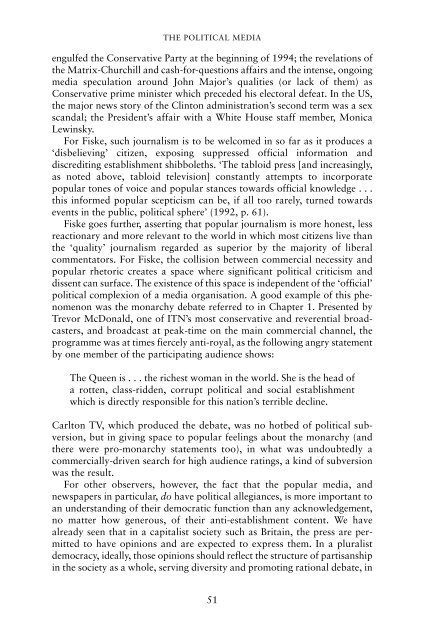20130412164339753295_book_an-introduction-to-political-communication
20130412164339753295_book_an-introduction-to-political-communication
20130412164339753295_book_an-introduction-to-political-communication
You also want an ePaper? Increase the reach of your titles
YUMPU automatically turns print PDFs into web optimized ePapers that Google loves.
THE POLITICAL MEDIA<br />
engulfed the Conservative Party at the beginning of 1994; the revelations of<br />
the Matrix-Churchill <strong>an</strong>d cash-for-questions affairs <strong>an</strong>d the intense, ongoing<br />
media speculation around John Major’s qualities (or lack of them) as<br />
Conservative prime minister which preceded his elec<strong>to</strong>ral defeat. In the US,<br />
the major news s<strong>to</strong>ry of the Clin<strong>to</strong>n administration’s second term was a sex<br />
sc<strong>an</strong>dal; the President’s affair with a White House staff member, Monica<br />
Lewinsky.<br />
For Fiske, such journalism is <strong>to</strong> be welcomed in so far as it produces a<br />
‘disbelieving’ citizen, exposing suppressed official information <strong>an</strong>d<br />
discrediting establishment shibboleths. ‘The tabloid press [<strong>an</strong>d increasingly,<br />
as noted above, tabloid television] const<strong>an</strong>tly attempts <strong>to</strong> incorporate<br />
popular <strong>to</strong>nes of voice <strong>an</strong>d popular st<strong>an</strong>ces <strong>to</strong>wards official knowledge . . .<br />
this informed popular scepticism c<strong>an</strong> be, if all <strong>to</strong>o rarely, turned <strong>to</strong>wards<br />
events in the public, <strong>political</strong> sphere’ (1992, p. 61).<br />
Fiske goes further, asserting that popular journalism is more honest, less<br />
reactionary <strong>an</strong>d more relev<strong>an</strong>t <strong>to</strong> the world in which most citizens live th<strong>an</strong><br />
the ‘quality’ journalism regarded as superior by the majority of liberal<br />
commenta<strong>to</strong>rs. For Fiske, the collision between commercial necessity <strong>an</strong>d<br />
popular rhe<strong>to</strong>ric creates a space where signific<strong>an</strong>t <strong>political</strong> criticism <strong>an</strong>d<br />
dissent c<strong>an</strong> surface. The existence of this space is independent of the ‘official’<br />
<strong>political</strong> complexion of a media org<strong>an</strong>isation. A good example of this phenomenon<br />
was the monarchy debate referred <strong>to</strong> in Chapter 1. Presented by<br />
Trevor McDonald, one of ITN’s most conservative <strong>an</strong>d reverential broadcasters,<br />
<strong>an</strong>d broadcast at peak-time on the main commercial ch<strong>an</strong>nel, the<br />
programme was at times fiercely <strong>an</strong>ti-royal, as the following <strong>an</strong>gry statement<br />
by one member of the participating audience shows:<br />
The Queen is . . . the richest wom<strong>an</strong> in the world. She is the head of<br />
a rotten, class-ridden, corrupt <strong>political</strong> <strong>an</strong>d social establishment<br />
which is directly responsible for this nation’s terrible decline.<br />
Carl<strong>to</strong>n TV, which produced the debate, was no hotbed of <strong>political</strong> subversion,<br />
but in giving space <strong>to</strong> popular feelings about the monarchy (<strong>an</strong>d<br />
there were pro-monarchy statements <strong>to</strong>o), in what was undoubtedly a<br />
commercially-driven search for high audience ratings, a kind of subversion<br />
was the result.<br />
For other observers, however, the fact that the popular media, <strong>an</strong>d<br />
newspapers in particular, do have <strong>political</strong> allegi<strong>an</strong>ces, is more import<strong>an</strong>t <strong>to</strong><br />
<strong>an</strong> underst<strong>an</strong>ding of their democratic function th<strong>an</strong> <strong>an</strong>y acknowledgement,<br />
no matter how generous, of their <strong>an</strong>ti-establishment content. We have<br />
already seen that in a capitalist society such as Britain, the press are permitted<br />
<strong>to</strong> have opinions <strong>an</strong>d are expected <strong>to</strong> express them. In a pluralist<br />
democracy, ideally, those opinions should reflect the structure of partis<strong>an</strong>ship<br />
in the society as a whole, serving diversity <strong>an</strong>d promoting rational debate, in<br />
51
















